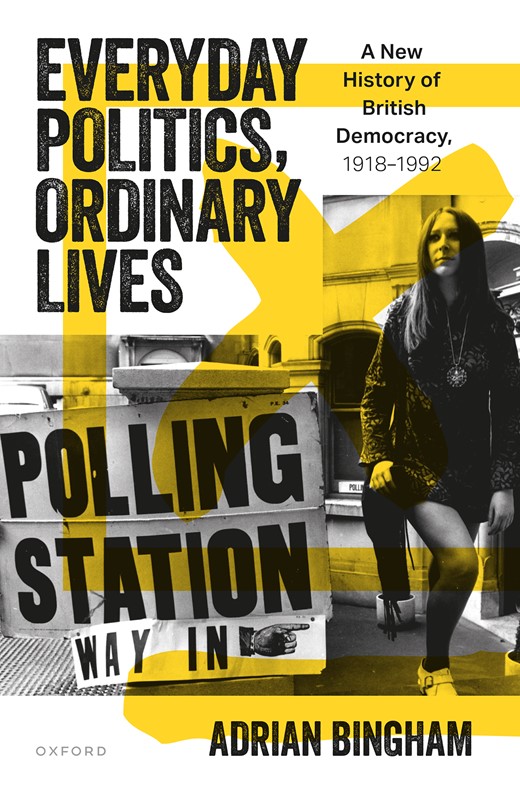 Everyday Politics, Ordinary Lives: A New History of British Democracy, 1918–1992
Everyday Politics, Ordinary Lives: A New History of British Democracy, 1918–1992
Contents
-
-
-
-
-
-
-
-
-
-
Inflation, Industrial Relations, and Economic Turbulence 1970–1976 Inflation, Industrial Relations, and Economic Turbulence 1970–1976
-
The Politics of Participation: The Referendum on the European Community, 1975 The Politics of Participation: The Referendum on the European Community, 1975
-
The Politics of Participation: Referendums in Scotland and Wales The Politics of Participation: Referendums in Scotland and Wales
-
Thatcher and the Realignment of British Politics 1975–1979 Thatcher and the Realignment of British Politics 1975–1979
-
A Nation, and an Opposition, Divided: 1979–1983 A Nation, and an Opposition, Divided: 1979–1983
-
Thatcher’s Britain? 1983–1992 Thatcher’s Britain? 1983–1992
-
Conclusion Conclusion
-
-
-
-
6 Divided Democracy, Early 1970s to Early 1990s
Get accessProfessor of Modern British History, School of History, Philosophy and Digital Humanities
-
Published:November 2024
Cite
Abstract
This chapter shows how the tensions underlying British politics emerged more clearly from the early 1970s as the economic situation worsened, and Conservative and Labour governments alike struggled to deal with challenges of weakening growth, inflation, and industrial action. Ordinary voters were becoming increasingly disillusioned with the main parties and susceptible to alternatives. Margaret Thatcher, who became Conservative leader in 1975, was able to exploit the appetite for change with a rhetoric of individual opportunity and the return of traditional values that resonated with people who were anxious about the overreach of the state, the power of trade unions, and the pace of social change. Thatcher alienated as many voters as she attracted, but she was able to marshal a powerful electoral coalition against a divided political opposition, particularly after her leadership in the Falklands War transformed belief in her overall competence. With social and economic divisions widening, however, and modest victories in general elections translating into crushing parliamentary majorities, significant sections of the population were becoming further disaffected with politics. The 1992 election demonstrated the importance of competence in voters’ calculations, but enthusiasm for politics, and trust in politicians, remained at a low ebb.
Sign in
Personal account
- Sign in with email/username & password
- Get email alerts
- Save searches
- Purchase content
- Activate your purchase/trial code
- Add your ORCID iD
Purchase
Our books are available by subscription or purchase to libraries and institutions.
Purchasing information| Month: | Total Views: |
|---|---|
| December 2024 | 2 |
| February 2025 | 2 |
| March 2025 | 4 |
| April 2025 | 13 |
| May 2025 | 1 |

Get help with access
Institutional access
Access to content on Oxford Academic is often provided through institutional subscriptions and purchases. If you are a member of an institution with an active account, you may be able to access content in one of the following ways:
IP based access
Typically, access is provided across an institutional network to a range of IP addresses. This authentication occurs automatically, and it is not possible to sign out of an IP authenticated account.
Sign in through your institution
Choose this option to get remote access when outside your institution. Shibboleth/Open Athens technology is used to provide single sign-on between your institution’s website and Oxford Academic.
If your institution is not listed or you cannot sign in to your institution’s website, please contact your librarian or administrator.
Sign in with a library card
Enter your library card number to sign in. If you cannot sign in, please contact your librarian.
Society Members
Society member access to a journal is achieved in one of the following ways:
Sign in through society site
Many societies offer single sign-on between the society website and Oxford Academic. If you see ‘Sign in through society site’ in the sign in pane within a journal:
If you do not have a society account or have forgotten your username or password, please contact your society.
Sign in using a personal account
Some societies use Oxford Academic personal accounts to provide access to their members. See below.
Personal account
A personal account can be used to get email alerts, save searches, purchase content, and activate subscriptions.
Some societies use Oxford Academic personal accounts to provide access to their members.
Viewing your signed in accounts
Click the account icon in the top right to:
Signed in but can't access content
Oxford Academic is home to a wide variety of products. The institutional subscription may not cover the content that you are trying to access. If you believe you should have access to that content, please contact your librarian.
Institutional account management
For librarians and administrators, your personal account also provides access to institutional account management. Here you will find options to view and activate subscriptions, manage institutional settings and access options, access usage statistics, and more.